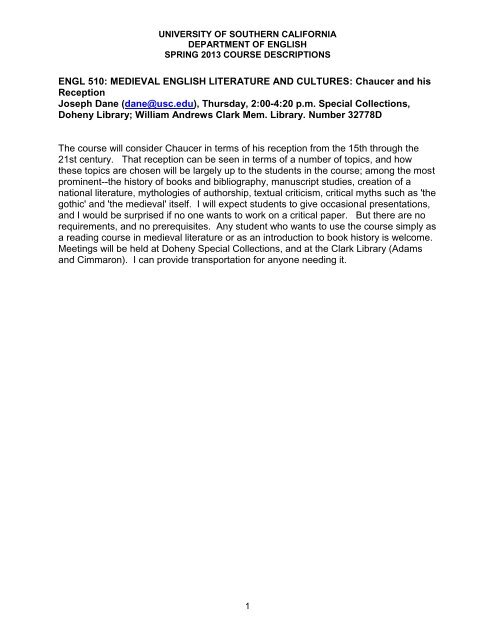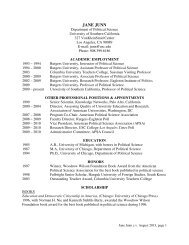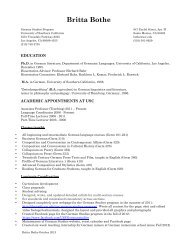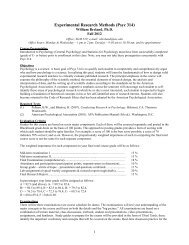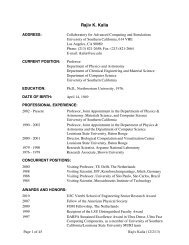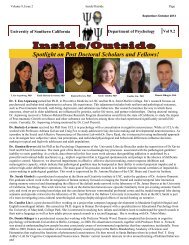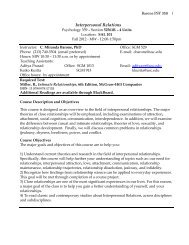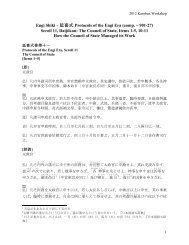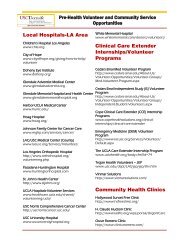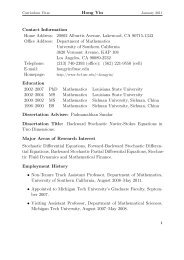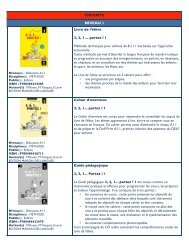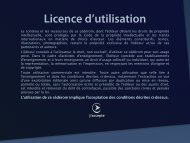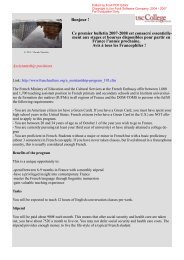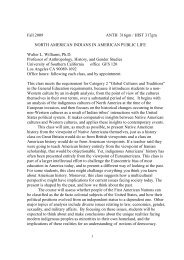ENGL 501: HISTORY OF LITERARY AND CULTURAL THEORY
ENGL 501: HISTORY OF LITERARY AND CULTURAL THEORY
ENGL 501: HISTORY OF LITERARY AND CULTURAL THEORY
Create successful ePaper yourself
Turn your PDF publications into a flip-book with our unique Google optimized e-Paper software.
UNIVERSITY <strong>OF</strong> SOUTHERN CALIFORNIA<br />
DEPARTMENT <strong>OF</strong> <strong>ENGL</strong>ISH<br />
SPRING 2013 COURSE DESCRIPTIONS<br />
<strong>ENGL</strong> 510: MEDIEVAL <strong>ENGL</strong>ISH LITERATURE <strong>AND</strong> CULTURES: Chaucer and his<br />
Reception<br />
Joseph Dane (dane@usc.edu), Thursday, 2:00-4:20 p.m. Special Collections,<br />
Doheny Library; William Andrews Clark Mem. Library. Number 32778D<br />
The course will consider Chaucer in terms of his reception from the 15th through the<br />
21st century. That reception can be seen in terms of a number of topics, and how<br />
these topics are chosen will be largely up to the students in the course; among the most<br />
prominent--the history of books and bibliography, manuscript studies, creation of a<br />
national literature, mythologies of authorship, textual criticism, critical myths such as 'the<br />
gothic' and 'the medieval' itself. I will expect students to give occasional presentations,<br />
and I would be surprised if no one wants to work on a critical paper. But there are no<br />
requirements, and no prerequisites. Any student who wants to use the course simply as<br />
a reading course in medieval literature or as an introduction to book history is welcome.<br />
Meetings will be held at Doheny Special Collections, and at the Clark Library (Adams<br />
and Cimmaron). I can provide transportation for anyone needing it.<br />
1
UNIVERSITY <strong>OF</strong> SOUTHERN CALIFORNIA<br />
DEPARTMENT <strong>OF</strong> <strong>ENGL</strong>ISH<br />
SPRING 2013 COURSE DESCRIPTIONS<br />
<strong>ENGL</strong> 530: RESTORATION <strong>AND</strong> 18 TH CENTURY BRITISH LITERATURES <strong>AND</strong><br />
CULTURES<br />
Leo Braudy (braudy@usc.edu), Monday, 2:00-4:30 p.m. Number 32781D<br />
In the middle of the seventeenth century, England experienced the first modern<br />
revolution. It began with the beheading of Charles I and the reign of Oliver Cromwell but<br />
did not end with the Restoration of Charles II to the throne. This political upheaval set<br />
the stage for a host of cultural changes that marked indelibly the transition from the<br />
Elizabethan world of courts and courtiers to the modern world of politics and public<br />
opinion. Assumptions about class and gender that had hardly varied since the Middle<br />
Ages were abruptly, and very openly, up for discussion and change. In this course we<br />
will look at the period stretching roughly from the English Civil Wars to the death of<br />
Alexander Pope in an attempt to understand the complex interplay between its literature<br />
and its politics (public and private), its economics, and its cultural values.<br />
We will begin with Marvell and Rochester, two poets who were not interested in<br />
being thought professional literary men but yet who clearly placed themselves in relation<br />
to a literary tradition. Dryden and Pope will be the other main poetic figures-representing<br />
a new assertion that the poet is particularly equipped to tell his audience<br />
what to believe about the world and to help them deal with it. Another important focus of<br />
the course will be the theatre of the Restoration period, the birthplace of a new<br />
conception of acting, the actor, and the idea of performance in the plays of Aphra Behn,<br />
Dryden, Sir George Etherege, George Farquhar, Thomas Otway, and William<br />
Wycherley. In addition we will read poems and prose by Mary Astell, Behn, Daniel<br />
Defoe, Anne Finch, John Locke, and Jonathan Swift.<br />
The course will be conducted in the second floor conference room of the William<br />
Andrews Clark Library on Adams Boulevard, so that we can draw upon the Clark's<br />
extensive and virtually unique collection of seventeenth- and eighteenth-century texts<br />
and thereby get a keener sense of what it was like to live in the cultural and material<br />
milieu where these works appeared. There will also be ample time to consider the visual<br />
culture of the period--paintings, sculpture, engravings, frontispieces--using the Clark’s<br />
resources.<br />
Three pieces of work will be required in the seminar: two papers approximately<br />
12-15 pages in length on topics developed in consultation; and an oral report (including<br />
annotated bibliography) on a topic in political, economic, or social history relevant to the<br />
general reading for the week.<br />
Students interested in the course are encouraged to e-mail me<br />
if they have any general questions. Our first class will include a tour<br />
of the Clark and its research facilities.<br />
2
UNIVERSITY <strong>OF</strong> SOUTHERN CALIFORNIA<br />
DEPARTMENT <strong>OF</strong> <strong>ENGL</strong>ISH<br />
SPRING 2013 COURSE DESCRIPTIONS<br />
<strong>ENGL</strong> 595: <strong>LITERARY</strong> STUDIES ACROSS CULTURES: “War and Memory”<br />
Viet Nguyen (vnguyen@usc.edu), Wednesday, 2:00-4:30 p.m. Number 32790D<br />
This course surveys theories of memory and problems in the relation of memory to war. On<br />
memory in general, the course traces the arc of memory studies, which gained momentum after<br />
the 1960s and has culminated in what some critics call a “memory boom” and a “memory<br />
industry.” We begin with Chris Marker’s premise, that “the function of remembering is not the<br />
opposite of forgetting, but rather its lining,” and consider the ethical, political, and aesthetic<br />
challenges for remembering and forgetting, both of which are necessary to confront war and its<br />
related traumas. Along the way, we will read some of the most important and influential books<br />
and essays in memory studies, with readings from Paul Ricoeur’s monumental Memory, History,<br />
Forgetting and The Collective Memory Reader dispersed throughout the semester. On memory<br />
and war, some of the case studies will come from World War I, the Holocaust, Japanese<br />
American internment, World War II, the Cold War, and the Vietnam War. Syllabus subject to<br />
change at instructor’s discretion.<br />
Requirements: a seminar presentation (30%), a book review (20%) and a 10 page paper<br />
(50%).<br />
Reading List<br />
1. Paul Connerton, How Societies Remember<br />
2. Paul Connerton, How Modernity Forgets<br />
3. Paul Fussell, The Great War and Modern Memory<br />
4. Charles Griswold, Forgiveness: A Philosophical Exploration<br />
5. Milan Kundera, The Book of Laughter and Forgetting<br />
6. Chris Marker, Sans Soleil (film screening)<br />
7. Jeffrey Olick, Vered Vinitzky-Seroussi, Daniel Levy, eds. The Collective Memory Reader<br />
8. Julie Otsuka, The Buddha in the Attic<br />
9. Paul Ricoeur, Memory, History, Forgetting<br />
10. Art Spiegelman, Maus I and II<br />
11. Diana Taylor, The Archive and the Repertoire: Performing Cultural Memory in the Americas<br />
12. WG Sebald, Austerlitz<br />
13. Marita Sturken, Tangled Memories : The Vietnam War, the AIDS Epidemic, and the Politics<br />
of Remembering<br />
14. Susan Rubin Suleiman, Crises of Memory and the Second World War<br />
15. Barbie Zelizer, Remembering to Forget: Holocaust Memory Through the Camera’s Eye<br />
3
UNIVERSITY <strong>OF</strong> SOUTHERN CALIFORNIA<br />
DEPARTMENT <strong>OF</strong> <strong>ENGL</strong>ISH<br />
SPRING 2013 COURSE DESCRIPTIONS<br />
<strong>ENGL</strong> 600x: PREPARING ARTICLES FOR PUBLICATION IN SCHOLARLY<br />
JOURNALS<br />
Susan Green, Wednesday, 4:30-6:50 p.m. Number 32888D<br />
Enrollment restriction: 10 students<br />
Participants in the seminar should begin by submitting, at the first session, an essay<br />
that they expect to reshape as a publishable article. A detailed project outline may also<br />
work as a starting point, but a completed essay will be required no later than halfway<br />
through the term, about March 1. In seminar sessions we will begin by critiquing<br />
published articles in the fields in which class members are working; participants should<br />
expect to identify at least five journals that are likely “targets” for publication. In<br />
discussion, we will identify the dialogues in our fields in which both individual articles<br />
and particular journals engage. We will develop strategies for entering that<br />
conversation, focusing on structure, language, and documentation.<br />
4
UNIVERSITY <strong>OF</strong> SOUTHERN CALIFORNIA<br />
DEPARTMENT <strong>OF</strong> <strong>ENGL</strong>ISH<br />
SPRING 2013 COURSE DESCRIPTIONS<br />
<strong>ENGL</strong> 660: STUDIES IN GENRE: Contemporary Theatre and Performance<br />
David Roman, Tuesday, 2:00- 4:20 p.m. Course Number 32800D<br />
We’ll spend the semester considering the contemporary theatre and performance scene<br />
in the United States. The class will primarily be composed of seeing live events<br />
throughout greater Los Angeles and writing performance reviews for publication. The<br />
goals of the class are several. First, we will interrogate the concept of the<br />
“contemporary;” second, we will familiarize ourselves with the leading playwrights and<br />
performers in the field; third, we will consider the politics of performance, especially the<br />
role that performance plays in local, regional, and national publics; and fourth, we will<br />
learn to write about performance for publication. (Students from past semesters have<br />
published their reviews in various journals in the field.) To get a better sense of what<br />
performances I am considering, please see <strong>ENGL</strong> 499. Students will be expected to<br />
cover some of the costs of the tickets. The members of the class will help determine<br />
what events we attend.<br />
5
UNIVERSITY <strong>OF</strong> SOUTHERN CALIFORNIA<br />
DEPARTMENT <strong>OF</strong> <strong>ENGL</strong>ISH<br />
SPRING 2013 COURSE DESCRIPTIONS<br />
<strong>ENGL</strong> 695: GRADUATE FICTION FORM <strong>AND</strong> <strong>THEORY</strong><br />
David Treuer, Thursday, 2:00-4:20 p.m. Course Number 32802D<br />
This course will resemble more a gathering of detectives than a workshop. That is, it will<br />
be our job to peel back the different layers of Pale Fire – from the initial reading of “plot”<br />
and “character” to deeper levels that include a host of literary references. Step 1: Our<br />
first task is to read the novel as it was given—from beginning to end and from cover to<br />
cover. This reading is our first pass. On this pass we will collect as many of the literary<br />
references and clues we recognize immediately and make a master list as we discuss<br />
the plot and characters and story. We will then retreat from Pale Fire in order to read<br />
everything on that master list of obvious references (like Boswell’s Life of Johnson<br />
mentioned in the epigraph, the title Pale Fire drawn from both Hamlet and Timon of<br />
Athens, for example). Then we reread Pale Fire. Step 2: go back to the book and make<br />
a second list of texts/references that might not be so obvious (“The Adventure of the<br />
Empty House” and “Murders at the Rue Morgue” and “Four Quartets”). Step 3 repeat<br />
steps 1 and 2: Pale Fire and make a final list of buried, obscure, cleverly-hidden<br />
references (Egil’s Saga, The Kalevala, Song of Igor’s Campaign). Our final step will be<br />
to reread Pale Fire and reassemble the text using all the texts, clues, and traditions<br />
we’ve collected and collated. In doing so we will come into contact with a rich literary<br />
tradition from which Nabokov has cobbled his novel. Students will be expected to make<br />
regular presentations, engage in creative assignments (map-making, seating charts,<br />
etc), and to write critically.<br />
6
UNIVERSITY <strong>OF</strong> SOUTHERN CALIFORNIA<br />
DEPARTMENT <strong>OF</strong> <strong>ENGL</strong>ISH<br />
SPRING 2013 COURSE DESCRIPTIONS<br />
<strong>ENGL</strong> 697: GRADUATE FICTION WRITING WORKSHOP<br />
Dana Johnson, Wednesday, 4:30-6:50 p.m. Course Number 32804D<br />
This course is an intense practicum in advanced-level fiction writing and a traditional<br />
graduate fiction workshop. Writers will be required to hand in two to three submissions<br />
of 20-30 pages (novel or short story) during the semester. In addition, there will be<br />
revisions of a scene or scenes from one of each writer’s workshopped submissions at<br />
the end of the semester. We will also be reading a novel, Veronica, by Mary Gaitskill<br />
and a short story collection, Whose Song?, by Thomas Glave<br />
7
UNIVERSITY <strong>OF</strong> SOUTHERN CALIFORNIA<br />
DEPARTMENT <strong>OF</strong> <strong>ENGL</strong>ISH<br />
SPRING 2013 COURSE DESCRIPTIONS<br />
<strong>ENGL</strong> 698: GRADUATE POETRY FORM <strong>AND</strong> <strong>THEORY</strong>: Forms of seeing, Ways of<br />
listening<br />
Mark Irwin, Tuesday, 4:30-6:50 p.m. Course Number 32805D<br />
Beginning with Rilke's "Archaic Torso of Apollo," we will explore poems, visual works of<br />
art, and a few symphonies that provide unique ways of seeing or perceiving the world.<br />
Often inspired through concept, or crises in belief, these poets, painters, and composers<br />
create new boundaries in art through vision or the distortion of form. From Rimbaud's "<br />
The Drunken Boat" to Rilke's Duino Elegies, Frances Bacon's Triptychs, Ashbery’s “Self<br />
Portrait in a Convex Mirror,” Jorie Graham's "Pollock & Canvas," and the work of many<br />
younger poets, we will discuss works of art that arc, distort, and create new forms. Each<br />
student will write one paper, give a presentation, and produce a draft for a longer<br />
creative work in poetry.<br />
Reading/ Viewing/ Listening Formats<br />
John Ashbery: Selected Poems<br />
Anne Carson: Plainwater<br />
Italo Calvino. Invisible Cities. NY: Harcourt Brace, 1978.<br />
Jorie Graham. The End of Beauty. NY: Ecco, 1987<br />
Laura Kasischke: Space in Chains<br />
Mary Ruefle: Madness, Rack, and Honey: Collected Lectures<br />
Mary Ruefle: Selected Poems. NY: Wave Books.<br />
Arthur Rimbaud: “Le Bateau Ivre” (handout)<br />
Rainer Maria Rilke: The Selected Poems, Stephen Mitchell, trans.<br />
James Tate: The Eternal Ones of the Dream: New & Selected Poems (1990-2010). NY:<br />
Ecco/Harper Collins, 2012<br />
13 Younger Contemporary Poets, Mark Irwin, ed.<br />
Numerous Slides of Visual Works of Art<br />
Selected recordings of Philip Glass, Arvo Part, Christopher Rouse, Joan Tower and<br />
others.<br />
8


